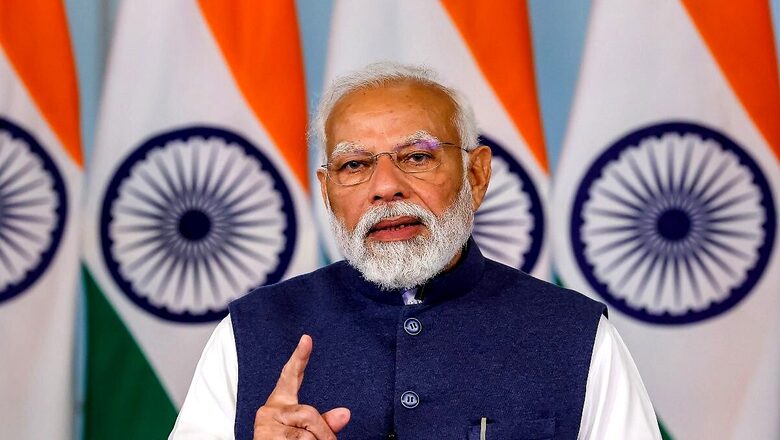
views
The Congress party has weakened India’s unity, integrity and interests, Prime Minister Narendra Modi said on Sunday, reacting to a media report that detailed what transpired in New Delhi’s power corridors in the build-up to the controversial handing over of the disputed Katchatheevu island by Indira Gandhi’s government to present-day Sri Lanka in 1974.
PM Modi was joined by a bevy of leaders of the Centre’s ruling Bharatiya Janata Party (BJP) who shared the link to the Times of India article on X (previously Twitter) and admonished the Congress for losing control over the island in Palk Strait. Some of them highlighted views by India’s first Prime Minister Jawaharlal Nehru, who was quoted in the article as saying he did not give much importance to the island and “would have no hesitation” giving up claims over it.
The documents, the TOI report said, were obtained by K Annamalai, Tamil Nadu’s BJP chief, through a Right to Information (RTI) application.
“Eye opening and startling! New facts reveal how Congress callously gave away #Katchatheevu,” PM Modi said.
“This has angered every Indian and reaffirmed in people’s minds- we can’t ever trust Congress!” he added in the same post, sharing a link to the article that pointed to indecision on the Centre’s part leading to the handover of the 1.9-square-kilometre island about 20km from Indian shore.
Eye opening and startling!New facts reveal how Congress callously gave away #Katchatheevu.
This has angered every Indian and reaffirmed in people’s minds- we can’t ever trust Congress!
Weakening India’s unity, integrity and interests has been Congress’ way of working for…
— Narendra Modi (@narendramodi) March 31, 2024
While Union Home Minister Amit Shah accused the Congress of working against “the unity and integrity of India”, BJP president JP Nadda said it was “part of Congress’ work culture to give up Indian territory given the slightest opportunity”.
Sharing the link to the article, Tamil Nadu BJP’s Annamalai said it was the “first part of the chronology of the betrayal of Congress & DMK”. The Dravida Munnetra Kazhagam (DMK), which rules Tamil Nadu, was in power during the 1974 handover and in the run-up to it as well.
“Both these parties chose to align with Sri Lankan interests, handed over Katchatheevu on a silver platter & put to risk the lives & livelihood of our Tamil Fishermen,” Annamalai posted on X.
Narayanan Thirupathy, another senior BJP leader in Tamil Nadu, repeated the charge and took potshots at the Congress and its political ally, the DMK. Thirupathy, too, said the decision to give up claims over the tiny island hurt Tamil Nadu’s fishermen community.
As the controversy snowballed, Tamil Nadu Congress spokesperson Americai Narayanan issued a rebuttal, stressing that his party is committed to the welfare of the state. He alleged that BJP leaders were trying to divide India through their “petty politics”.
The controversy came just weeks ahead of the first round of voting in the seven-phase Lok Sabha elections, with both the BJP and the Opposition alliance involving the Congress and the DMK eyeing an impressive performance in southern India. The BJP’s critics linked the controversy to the upcoming elections, and said it was being propped up as a poll issue.
“I attach no importance at all to this little island and I would have no hesitation in giving up our claim on it,” said then PM Jawaharlal Nehru.Read how the Nehru-Gandhi father-daughter duo ceded the strategic #Katchatheevu island to Sri Lanka.https://t.co/44p9N6m1a2
— Kangana Ranaut (Modi Ka Parivar) (@KanganaTeam) March 31, 2024
What BJP’s RTI Reveals About The Issue
The documents cited by TOI report detail how Sri Lanka, then Ceylon, pressed its claim on the piece of land right after Independence when it said the Indian Navy (then Royal Indian Navy) could not conduct exercises on the island without its permission.
New Delhi contested Sri Lanka’s claim for decades only to acquiesce finally in 1974. The documents bring forward the indecision of previous governments over the matter.
It cited a minute by first PM Jawaharlal Nehru on May 10, 1961, who dismissed the issue as inconsequential.
“I would’ve no hesitation in giving up claims to the island…I attach no importance at all to this little island and I would have no hesitation in giving up our claims to it. I do not like this pending indefinitely and being raised again in Parliament,” the TOI report quoted Nehru as saying.
Nehru’s minute is reportedly part of a note prepared by then commonwealth secretary Y D Gundevia, which the Ministry of External Affairs (MEA) shared as a backgrounder with the informal Consultative Committee of Parliament in 1968.
“The legal aspects of the question are highly complex. The question has been considered in some detail in this ministry. No clear conclusions can be drawn as to the strength of either India’s or Ceylon’s claim to sovereignty,” the ministry said in the backgrounder at the time.
However, the then attorney general M C Setalvad, in 1960, opined that India had a stronger claim on the island formed by a volcanic eruption.
Referring to the zamindari rights given by the East India Company to Raja of Ramnad (Ramnathpuram) over the islet fishery and other resources around it, Setalvad wrote, “The matter is by no means clear or free from difficulty but on the assessment of the whole evidence it appears to me that the balance lies in concluding that the sovereignty of India was and is in India.”
This continued from 1875 to 1948 and was vested in the State of Madras following the abolition of zamindari rights. However, the Raja of Ramnad continued to exercise his zamindari rights independently, without having to pay taxes to Sri Lanka.
In June 1974, the decision to hand over Katchatheevu was conveyed to then Tamil Nadu Chief Minister M Karunanidhi by then foreign secretary Kewal Singh.
Singh mentioned the zamindari rights of the Raja of Ramnad (Ramanathapuram) and the failure of Sri Lanka to show evidence to prove its claim of holding Katchatheevu.
However, the foreign secretary also said that Sri Lanka had a “very determined position” on Katchatheevu and cited “records” showing the key island to be a part of the kingdom of Jaffnapatnam, Dutch and British maps, TOI reported.



















Comments
0 comment